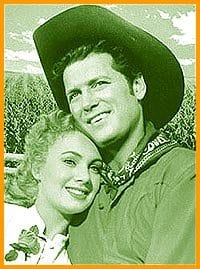Is Ricky Martin being groped by a man’s hand in the “She Bang” video?
The one where Ricky attends an underwater party and things start getting wild. Have you seen it? The video flashes images – one of which is of Ricky, with girl-hands stroking his bare torso.
Yet suddenly, you have to ask yourself, “Did I just see a man’s hand dart in there? Is Ricky sending a message?”
If you’ve ever asked a similar question, you’re following an age-old tradition of gay men and lesbians searching popular culture for queer subtext. For his part, UK columnist and critic David Benedict has been searching for queer signals throughout the history of musicals and Oklahomo is the result.
Oklahomo is a lecture cum performance piece, featuring film clips from the golden age of musicals – from 1935’s Tinkle Me Pink right up to 1968’s Thoroughly Modern Millie- illustrating Benedict’s hilarious findings. Toronto gets its first chance to laugh along early next month at the Six Stages Festival.
But searching musicals for signs of gayness – how hard could that be? Benedict asks back: “Why do we view musicals as camp? Why do we automatically assume gay? Who was making these musicals and who were they making them for?”
On of the clips Benedict shows is from Follow The Fleet. Fred Astaire, dressed in a sailor suit, teaches his male companions how to waltz.
Was Astaire, king of smooth, giving us a glimpse into his hidden desires? Was someone sending us a signal? “I would like to say that my research has lead me to find that these musicals were produced by gay men who were signaling to their gay audiences,” says Benedict. “But it just isn’t so.”
The question isn’t so much about who is sending the message but rather, who is perceiving it. “Growing up in a heterosexual world, lesbians and gays learn to act,” says Benedict. “Our empirical understanding of acting lends a further layer to the business of watching actors on screen.
“We learn to mentally make gender switches, read different layers,” says Benedict. “You look for a double meaning because your life has a double meaning.”
Even though homosexuality is portrayed more openly than ever, we homos still search for hidden signs in pop culture. This raises the hoary question of nature versus nurture. Are we forever wired for double meanings?
Oklahomo manages to explore our nature without dragging out the textbooks. “Now you don’t need to have furnished your home at Ikea to know that lesbians and gays are born to shop,” goes Benedict’s script. “But as the nature/nurture debate proves, a little environmental training goes a long way.”
Oklahomo ends with this summation of the state of film musicals: “In the days when the real world offered closeted lesbians and gays so little room for manoeuvre, the escapism of musicals offered, quite literally, fantastic possibilities for emotional release. That’s one reason why the musical died in the 1970s: By then, we were realizing our dreams both off and on-screen.”
Yet to suggest liberation of any kind is the partial cause of the decline of musicals sounds like the stuff that doctorates are made of. And a thesis, doctorate or otherwise, is something Benedict is steering clear of. “Thesis? Here I go being dangerous but, I don’t think there is one. [Oklahomo] is an investigation into the nature of camp.”
Benedict promises to treat the subject of camp campily; the meat and potatoes of queer theory served as a frothy dessert.
Musicals, by playing out the very real desires of the heart on a fantastical level, appeal to those among us with a taste for duality, complexity and lateral thinking. Like the musicals it celebrates, Oklahomo will play out on a variety of levels.
The synchronicity is delightful and the pay off should be laughter.
Oklahomo is at 11pm on Thu, Feb 8 at Tallulah’s Cabaret (12 Alexander St); tix are $10.

 Why you can trust Xtra
Why you can trust Xtra


